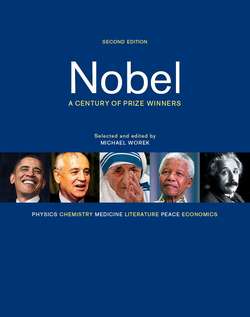Читать книгу Nobel - Michael Worek - Страница 49
На сайте Литреса книга снята с продажи.
ОглавлениеJohannes Stark (1874–1957)
1919 Physics
For his discovery of the Doppler effect in canal rays and the splitting of spectral lines in electric fields.
The German Johannes Stark was one of the scientists who supported Hitler, declaring his allegiance in 1924 and joining the Nazi party in 1930. A confirmed anti-Semite, he defended the idea of a “German science” as opposed to a “Jewish science” and opposed Jewish scientists like Einstein.
In 1933 he was elected president of the Reich Physical-Technical Institute and remained in this position until his retirement in 1939. During this period he also assumed the presidency of the German Research Association. Despite defending the need for Germany to carry out an applied investigation into the production of technological methods and industries of war, Stark’s influence among his contemporaries was declining, even before the fall of the Third Reich. After World War II, he was sentenced to four years hard labor for his Nazi ties, a sentence that was later suspended.
In spite of his racial and political views, Stark’s career was important to science and was distinguished in various ways. In 1910 he won the Baumgartner Prize of the Vienna Academy of Sciences and the Vahlbruch Prize of the Göttingen Science Academy in 1914. Stark was also a member of academies in Göttingen, Rome, Vienna and Calcutta. The Nobel Prize in Physics was awarded to him in 1919 for the “discovery of the Doppler effect in canal rays and the splitting of spectral lines in electric fields,” an effect that was named after him. The prize enabled him to set up a private laboratory.
Stark was born in Schickenhof on one of his father’s estates. Initially he studied in Bayreuth and Regensberg then went to the University of Munich in 1894. In 1900 he became an unpaid staff member at the University of Göttingen.
A prolific writer, Stark published more than 300 scientific papers. In 1902 his book, Die Elektrizität in Gasen (Electricity in Gases), was published. He also founded the Jahrbuch der Radioaktivität und Elektronik (The Yearbook of Radioactivity and Electronics), a publication he edited between 1904 and 1913.
He died on the June 21, 1957, in Traunstein, Germany. In his later years he continued his research in his private laboratory. Besides his scientific life and political convictions, Stark married Luise Uepler and had five children. His hobbies included forestry and the cultivation of fruit trees.
